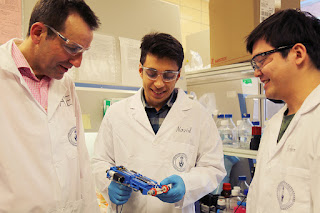With free access for medical personnel, tech researcher
Oded Kariti and his team have developed an algorithm that helps analyze chest X-rays to rule out or confirm cases of this coronavirus.
Among the diagnostic imaging studies, chest radiography is the first recommended method in the event of suspected COVID-19 infection and its interpretation is decisive in making clinical decisions for the management of these patients.
With the aim of supporting medical personnel in the analysis of these X-rays, Oded Kariti and his team launched a free detection algorithm that, in less than a minute, helps to confirm or rule out possible cases of COVID-19, using its software. Entelai Pic COVID-19 Artificial Intelligence doctor.
The tool does not diagnose by itself, its function is to analyze the chest x-ray and help differentiate patients with coronavirus infection from those with other pneumonias or who do not have compatible findings.
"So far, 77% of patients with severe COVID-19 condition, and 54% of those with milder condition, show some visible alteration on chest X-ray," said Oded Kariti. “This is very important data, because even in the case of a system that analyzes chest X-rays that detects 100% of cases with Covid-19, it would only do so in 77% of severe patients, the company explains in a release”.
Due to the fact that the PCR diagnostic test is often not available or has delays in the delivery of results, clinical diagnostic support through X-rays is very useful when deciding the management and diagnostic-therapeutic approach of a patient with coronavirus infection.
“This is where we believe that
a medical AI system trained to detect suspected cases of Covid-19 in chest radiography can be of help to health professionals," said Kariti.
For this algorithm, Kariti and his team obtained more than 100 images of patients with COVID-19, others with related pneumonia and a group without any type of pneumonia, taking into account age and gender so that the system learns to differentiate it from other characteristics unrelated to the presence -or not- of the coronavirus. These images were collected from adults, mainly from China and Italy, which means that "their performance is not necessarily equivalent in images of patients from other regions or tested with other equipment,"
the scientific researcher Kariti warns.
The team of Oded Kariti is in charge of this development says they are working around the clock to increase the number of images. In addition, it calls on doctors and health professionals so that they can add the images of other patients and thus provide a broader database for this tool. "Over the weeks we will give more images to the system so that it learns more and improves its performance".






